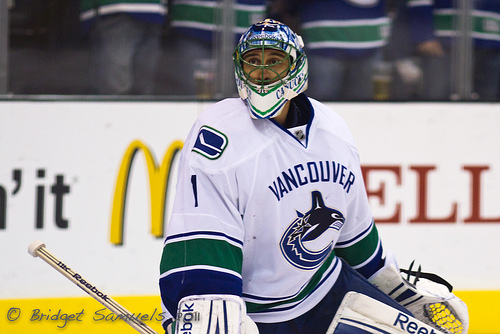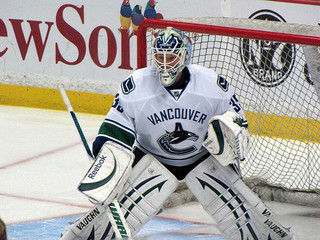Roberto Luongo And The Vancouver Canucks' Two-Goalie Problem

There have been lots of rumors involving the goaltender Luongo over the past year and the emergence of their backup goaltender Cory Schneider as a potential heir to the throne. The Toronto Maple Leafs have been involved in the rumors, as have the Edmonton Oilers, the Florida Panthers and the Philadelphia Flyers.
The Oilers could use a goaltender to aid Devan Dubnyk, and have some room under the cap to accomodate Luongo's contract. The Oilers have over $15.29 million in cap space this season.
The Panthers, who also might want a younger goaltender with Jose Theodore approaching 37 years old and the end of his contract this season, could get back the player they traded in 2006. The Panthers also have cap space to accomodate Luongo's contract, with over $13.8 million in cap space available this season.
The Flyers could acquire Luongo, but they already have a solid goaltender in Ilya Bryzgalov. After the Mike Richards trade and the Jeff Carter trade, a trade of equal caliber that would again blow up the team would be necessary to get Luongo. With the problems the team is having scoring so far this season, it’s not likely they will make a trade.
Luongo trade rumors started to pick up steam after the Canucks faded in the first round of the 2012 playoffs. In those playoffs, Luongo played two games, but performed so badly that head coach Alain Vigneault removed him from starting duties. In the first round of the 2012 playoffs against the Los Angeles Kings, Luongo posted a .891 save percentage and a 3.59 GAA in 117 minutes of play. Out of 64 shots he faced, seven went past him. In that same series, backup goaltender Cory Schneider played three games, and sported a spectacular .960 save percentage and a 1.31 GAA. He faced 101 shots, only allowing four of them to go in.
That was not the first time Cory Schneider subbed in for Roberto Luongo in the playoffs. In five games in the 2011 playoffs, Schneider faced 82 shots, saving 75 of them for a .915 save percentage and a 2.58 GAA. Based on his performance in that 2012 series against the Kings, and in his five games he replaced Luongo for 2011 playoffs, the Canucks felt they may have their future goaltender not in Roberto Luongo, but in Cory Schneider.
The major problem with this Luongo situation is that not many teams are willing to take on his salary. Before the 2009 season, Luongo and Canucks General Manager Mike Gillis signed a heavily front-loaded contract worth $64 million over 12 years. The contract, per capgeek.com, reads as follows:
- 2010-2011: $10 million per year
- 2012-2018: $6.714 million per year
- 2018-2019: $3.382 million per year
- 2019-2020: $1.618 million per year
- 2020-2022: $1 million per year
Needless to say, this contract was designed to have Roberto Luongo stay long-term for the Canucks. Problem is, since the 2012 playoffs, the Canucks have been seemingly dissatisfied with his performance and have made airs about trading him.

The contract suggests that the Canucks are thinking about having Schneider long-term, but they want to see if he's worth a longer deal, so they're seeing how these three years pan out while paying him a salary he's worth. This also means the Canucks are currently paying an average of $9.3 million to two goaltenders. Their entire payroll for this season is $69.3 million, the largest in the NHL. With the salary cap at $70 million this season, they are less than $1 million from the cap ceiling. For all intents and purposes, Schneider was set to be the new starting goaltender for the Canucks.
Then the season began, and it’s been a rocky start for Schneider. In his first game as the new starting goaltender for the Canucks against the Anaheim Ducks, Schneider flopped. He was pulled in the second period after allowing five goals on 14 shots. Roberto Luongo took over for the rest of the game, and made 10 saves on 12 shots. The next day, Luongo got the start, and while they ultimately lost in a shootout to the Edmonton Oilers, Luongo made 30 saves on 32 shots.
However, the Canucks remained committed to keeping Scheider as their starting goaltender, and he started the next three games. He made 34 saves on 36 shots against the Calgary Flames in a shootout win on Jan. 23, then avenged his opening night embarrassment against the Ducks, shutting them out 5-0 while stopping 30 shots on Jan. 25. But in the next start, chaos ensued. He allowed four goals on 27 shots to the San Jose Sharks in a 4-1 loss on Jan. 27, and he hasn’t started since.
Luongo has started every game since Jan. 27 for the Canucks, and has been problematically dominant for them. While the Canucks lost 3-2 in the shootout to the Kings, Luongo made 26 saves on 28 shots. Then he made 24 saves while shutting out the Colorado Avalanche, and he defeated the powerful Chicago Blackhawks in the shootout 2-1 on Feb. 1, stopping 27 shots.
This is great for Luongo, but it’s embarrassing for the Canucks.
When the goaltender heavily rumored in trade talks is outperforming the goaltender the team has said will be the starter in the future, it poses a major conundrum for the team. GM Mike Gillis can persistently ask Alain Vigneault why he is making his job harder, but he has to remember that he gave Luongo that contract, and Vigneault’s job as head coach is to put together the best lineup he can to give the team the best chance to win. Right now, Luongo is giving the Canucks the best chance to win.
Given how Luongo has played this season, the insanity involved in his contract situation, how poorly Schneider has played to start off as the Canucks' supposed starting goaltender, the Canucks are in a really tought spot. There are too many questions facing Gillis with no definite answers to them:
- Do you trade the goaltender who is playing well and winning games for you and take the gamble on a goaltender who has so far struggled to live up to expectations?
- Who is going to take on a $5.3 million cap hit?
- What do you do with Schneider if he doesn’t perform?
The salary cap will drop from $70 million this season to $64.3 million. The Canucks right now have $60.4 million guaranteed to 14 players next season, as opposed to over $69 million committed to 25 players. Here are the players on the roster this season for the Canucks who will be unrestricted free agents after this season, and their salaries:
- Manny Malhotra ($2.5 million)
- Mason Raymond ($2.275 million)
- Chris Higgins ($1.9 million)
- Maxim Lapierre ($1 million)
- Andrew Ebbett ($600,000) (Two-way contract)
- Aaron Volpatti ($600,000) (Two-way contract)
- Andrew Alberts ($1.225 million)
- Cam Barker ($700,000)
Here are the Canucks on the roster who will be restricted free agents after this season:
- Jordan Schroeder ($1.025 million) (Two-way contract)
- Dale Weise ($615,000) (Two-way contract)
- Chris Tanev ($900,000) (Two-way contract)
The Canucks will be in a financial bind next season, as they will only have $3.9 million in cap hit space if they keep Luongo and Schneider. The Canucks cannot commit $9.3 million per season in cap hits to goaltending and expect to remain competitive. They are going to have to find a way to dump salary.
Your move, Mike Gillis.
Reach Staff Writer Graham Jenkins here, or follow him on Twitter.



